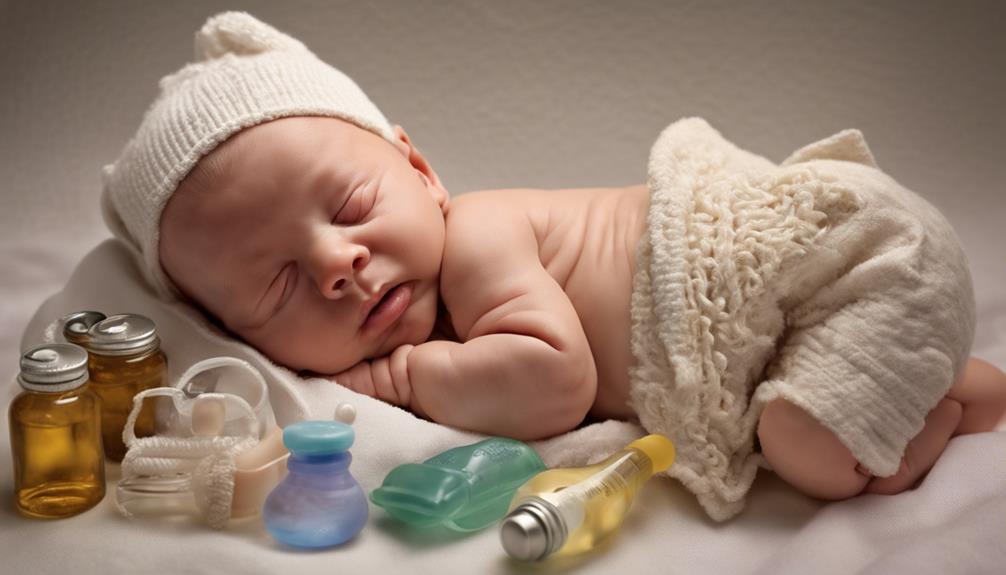As we delve into the world of newborn care, we are faced with many questions and uncertainties. How can we guarantee the well-being and safety of these vulnerable individuals under our care? Where do we begin in gaining the essential knowledge required for newborn care?
Join us as we uncover the intricacies of this crucial class, offering insights that could potentially transform your approach to caring for newborns. Our journey together promises to be enlightening, empowering, and above all, essential for those seeking to provide the best possible care for our newest arrivals.
Key Takeaways
- Prioritize essential practices like thermal care, infection prevention, breathing initiation, and feeding support.
- Ensure proper diapering and hygiene practices for comfort and health.
- Emphasize the importance of breastfeeding for essential nutrients and bonding.
- Implement safe sleep practices to reduce the risk of Sudden Infant Death Syndrome.

Frida Baby Rectal Thermometer for Babies, Digital Fever Thermometer for Babies, Newborns & Infants, Quick & Accurate Temperature Check, Water Resistant, Clear Case, Memory Holds Last 10 Readings
PRECISION FOR PEACE OF MIND: Delivers accurate temperature readings in just 10 seconds, so you can quickly assess…
As an affiliate, we earn on qualifying purchases.
As an affiliate, we earn on qualifying purchases.
Newborn Care Basics
When caring for a newborn, prioritizing essential practices like thermal care, infection prevention, breathing initiation, feeding support, and monitoring for danger signs is important for their well-being. Health workers play an important role in ensuring these essential newborn care basics are met to promote a healthy start in life.
Immediate drying and warming of newborns after birth help maintain their body temperature, while skin-to-skin contact not only regulates temperature but also fosters a strong bond with parents. Clean practices during childbirth are paramount in reducing the risk of infections, safeguarding the health of the newborn.

Kopi Baby Portable Diaper Changing Pad – Baby Diaper Changer Travel Bag with Wipes Pocket, Smart Design Portable Changing Mat, Infant Travel Station Kit, Gift for Newborn Girl & Boy – Grey, Classic
PERFECTLY PORTABLE CHANGING STATION – with Kopi Baby’s diaper changing pad, you can have a clean, waterproof and…
As an affiliate, we earn on qualifying purchases.
As an affiliate, we earn on qualifying purchases.
Diapering and Hygiene

Maintaining proper diapering practices is essential for ensuring the hygiene and comfort of your newborn. To promote newborn health, remember to always wipe from front to back during diaper changes to prevent infections. Changing diapers frequently, ideally every 2-3 hours, is critical for maintaining good hygiene and preventing diaper rash. Use mild baby wipes or warm water with cotton balls for cleaning, as this helps keep the diaper area clean and dry.
When it comes to umbilical cord care, make sure the area is kept clean and dry. Fold the diaper down below the cord stump to allow air circulation and prevent irritation. It's important to wash your hands thoroughly before and after each diaper change to prevent the spread of germs to your baby.

My Brest Friend Nursing Pillow – Deluxe – Enhanced Comfort w/ Slipcover – Ergonomic Breastfeeding Pillow For Ultimate Support For Mom & Baby – Adjustable Pillow W/ Handy Side Pocket, Soft Rose
ERGONOMIC DESIGN: Elevate your nursing journey with our unique nursing pillow. The wrap-around feature ensures ideal positioning &…
As an affiliate, we earn on qualifying purchases.
As an affiliate, we earn on qualifying purchases.
Feeding Essentials
To guarantee the well-being and nourishment of your newborn, understanding the importance of feeding essentials is paramount. Breastfeeding not only provides essential nutrients and antibodies vital for health but also fosters a strong bond between you and your baby. Here is a guide for essential practice to ensure successful feeding:
| Feeding Essential | Description | Importance |
|---|---|---|
| Skin-to-Skin Contact | Promotes successful breastfeeding initiation within the first hour after birth | Establishes a strong emotional connection and supports milk production |
| Proper Latch | Ensures effective milk transfer and prevents nipple soreness | Facilitates adequate nutrition and prevents discomfort for both you and your baby |
| Exclusive Breastfeeding | Protects against infections and enhances bonding | Provides optimal nutrition and strengthens the immune system |

Owlet Dream Sock® – FDA-Cleared Smart Baby Monitor – Track Live Pulse (Heart) Rate, Oxygen in Infants – Receive Notifications – Mint
FDA-Cleared Wearable Baby Monitor: Dream Sock is the first FDA-cleared smart baby monitor providing real-time pulse rate and…
As an affiliate, we earn on qualifying purchases.
As an affiliate, we earn on qualifying purchases.
Soothing Techniques

Let's explore effective ways to calm and comfort your newborn through soothing techniques. Essential newborn care involves understanding how to soothe your little one when they're fussy or upset. Here are some techniques to help you create a peaceful environment for your baby:
- Gentle Swaddling: Wrapping your baby snugly in a soft blanket can provide a sense of security and mimic the coziness of the womb.
- White Noise or Gentle Sounds: Playing calming sounds such as white noise or gentle lullabies can help soothe your newborn and create a relaxing atmosphere.
- Rhythmic Movements: Rocking or swaying your baby gently can replicate the comforting movements they experienced in the womb, promoting relaxation.
- Pacifier or Sucking on a Clean Finger: Offering a pacifier or letting your baby suck on a clean finger can help satisfy their natural sucking reflex and bring them comfort.
These techniques can aid in soothing your newborn and fostering a strong bond between you and your little one.
Safe Sleep Practices
When your newborn is ready to rest, ensuring safe sleep practices is paramount for their well-being, starting with placing them on their backs to reduce the risk of Sudden Infant Death Syndrome (SIDS).
In our guide to Postpartum and Newborn Care, we emphasize the importance of creating a safe sleep environment. Avoid soft bedding, pillows, and toys in the sleep area to prevent suffocation or entrapment for newborns.
Room-sharing without bed-sharing is advised, allowing easy access for feeding and comforting while promoting safe sleep practices. It's important to maintain a firm and flat sleep surface to prevent accidental suffocation or the re-breathing of carbon dioxide.
Additionally, keeping the sleep area free from smoke exposure is essential, as it not only increases the risk of SIDS but also poses respiratory issues for newborns.
Frequently Asked Questions
What Are the 4 Steps in Essential Newborn Care?
We focus on the 4 steps in essential newborn care: thermal care, infection prevention, initiation of breathing, and feeding support. These steps guarantee a healthy start for newborns by maintaining body temperature, preventing infections, ensuring breathing, and supporting feeding.
What Are the 5 Steps of Newborn Care?
Ensuring the 5 essential steps of newborn care: thermal care, infection prevention, initiation of breathing, feeding support, and monitoring for danger signs. Each step guarantees your baby's health and well-being.
What Is the Basic Essential Care of a Newborn?
We guarantee a newborn's well-being by offering thermal care, preventing infections, initiating proper breathing, supporting feeding, and monitoring for any danger signs. These essential steps help us nurture and safeguard the health of our precious little ones.
What Is the Essential Care of a Normal Newborn?
We prioritize essential care for a normal newborn. This includes thermal care, infection prevention, breathing support, feeding guidance, and monitoring for danger signs. These steps are vital for their well-being and help guarantee a healthy start in life.
Conclusion
To sum up, mastering essential newborn care is crucial for health workers to provide the best possible support for newborns and their families. By learning skills like proper diapering and feeding techniques, health workers can make a significant impact on newborn health outcomes.
For example, a nurse who completed the ENCC course was able to identify early signs of jaundice in a newborn, leading to prompt treatment and a successful recovery. With dedication and training, we can all play a role in saving newborn lives.








